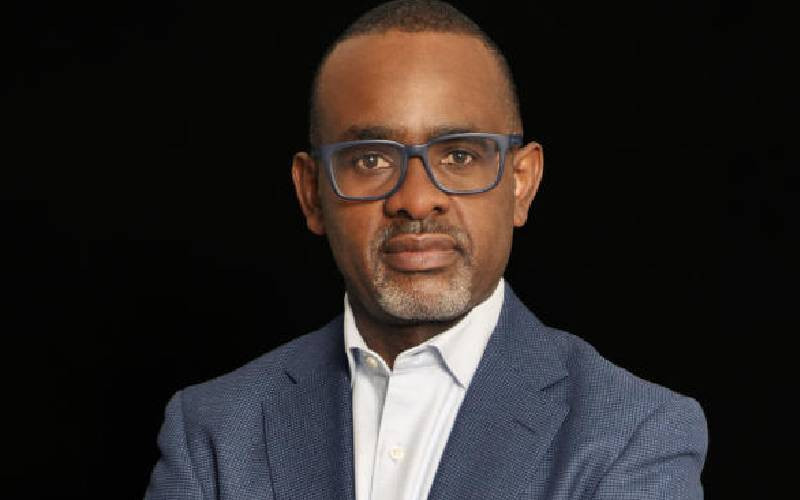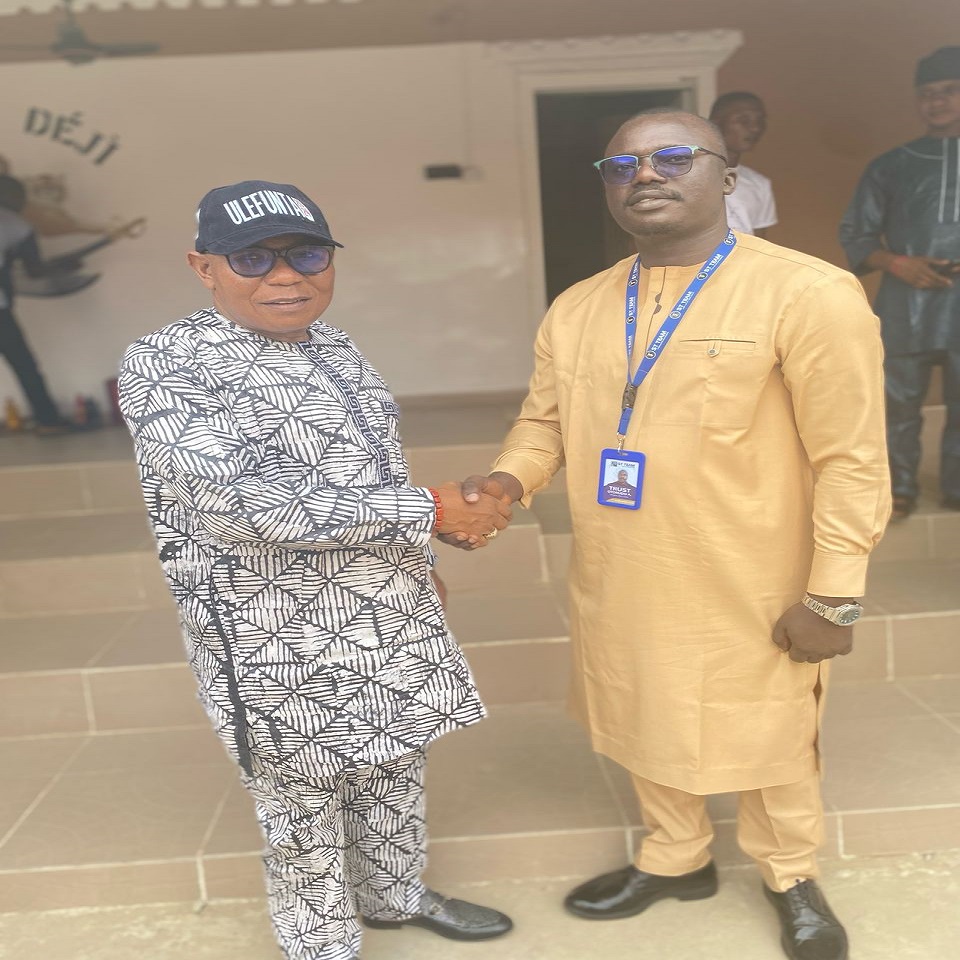News
What We Can Learn from Africa’s Small Business Success Stories

By Gerald Maithya, General Manager, Microsoft Africa Transformation Office
Africa is often hailed as the birthplace of some of the world’s most exciting tech startups. From Cape to Cairo, small businesses across the continent have become catalysts for change, helping to drive economic prosperity and leaving their mark on local society. In fact, it’s predicted that Africa’s digital economy, fueled by hundreds of active tech hubs, could contribute nearly $180 billion to the region’s growth by the mid-decade.

Gerald Maithya, General Manager, Microsoft Africa Transformation Office –
Having produced several industry shakers in the fintech space, it’s perhaps not surprising that the continent has become a very attractive option for startup investment. According to BCG, the rate of growth in the number of African startups receiving financial backing between 2015 and 2022 was nearly six times faster than the global average. And during the first nine months of 2023 alone, these tech ventures raised around $1.4 billion.
With SMEs already accounting for up to 90 percent of businesses in Sub-Saharan Africa, much focus is placed on supporting this vital sector of the economy to reach the levels of success we’ve come to associate with Africa’s tenacious startup culture.
The question is – how do we empower the small business down the road to rise to the ranks of a Flutterwave in Nigeria or M-KOPA in Kenya?
The cloud effect
Much of the answer lies with providing these enterprises with the technology they need to drive operational efficiencies and scale their operations. Cloud technology, in the form of Microsoft Azure for example, has played an important part over the years in supporting Flutterwave’s core operations. Now as the company seeks to build on its success it is again looking to the expansion power of the cloud, building its next generation platform on Azure so that it can process high volume payments at scale, while also ensuring a seamless and secure payment experience for its clients.
Kenyan startup, M-KOPA, recently raised $250 million in debt equity. The company, which provides digital financial services to underbanked consumers, also relies heavily on the computing capacity of the cloud. In fact, its ability to process 500 payments per minute makes it possible for the startup to provide 3 million people across Africa with access to essential services such as solar power systems, digital loans, health insurance and smartphones.
Beyond fintech, small businesses are having a transformative impact on other key sectors such as healthcare. And as with Flutterwave and M-KOPA, many of these enterprises have something important in common – the backing of powerful technology.
In South Africa, Omnisient, is helping to elevate crucial decision-making across healthcare systems through a recent partnership with Altron HealthTech. The startup has created a platform that facilitates data collaboration across records and datasets and can securely match anonymised patient information in a safe environment for analysis. This allows Altron’s healthcare partners more insight into disease patterns and can improve treatments and medication efficacy. In the long term, Altron HealthTech hopes to use this information to support the healthcare industry in determining where new clinics, pharmacies and hospitals need to be built.
Another startup leaving its mark in the healthcare space, Zen Dawa, is helping to reimagine pharmaceutical operations across both rural and urban areas of East Africa by creating online access to pharmaceutical offerings as well as financing solutions for small businesses and pharmacy shops. By making use of Microsoft’s robust AI platform built on Azure, the startup is helping to contribute positively to the availability of essential medicines across East Africa.
There are still many questions to be answered, however, when it comes to drawing a larger number of the continent’s SMEs into the digital economy. Africa is still behind other regions in the world when it comes to digital infrastructure coverage, access, and quality. We are also still battling a shortage of skills and inadequate regulatory policy environments. In fact, with just 22 percent of the population online, Sub-Saharan Africa is still the world’s least connected region.
Supercharging Africa’s dynamic startup ecosystem
Addressing these issues will rely in no small part on the development of strategic alliances across both public and private sectors. These collaborations are pivotal to the development of comprehensive solutions to the multi-faceted challenges faced by small businesses in Africa. The FGN-ALAT digital Skillnovation Programme is a great example of this. A partnership between the Federal Government of Nigeria, Wema Bank, Get Funded Africa and Microsoft, the programme aims to train and equip one million micro, small and medium enterprises (MSMEs) across the country by the end of June 2024. Already 350, 000 MSMEs have been impacted.
Beyond skills, these businesses require business mentorship and access to market and finance opportunities – through effective collaboration the initiative aims to address all these needs in a holistic manner, facilitating opportunities, for example, to receive debt financing, equity investment and grants.
And by tapping into the distribution networks of multi-national corporations, the opportunity for strategic alliances to reach vast numbers of SMEs across the continent is significant. A recent partnership between Orange and Microsoft aims to accelerate the digitisation of small businesses in Africa by leveraging the telco’s formidable network to provide SMEs with access to Microsoft solutions such as Microsoft 365, Copilot, Azure, and Dynamics 365.
Similarly, the FAST Accelerator programme, which was launched together by Flapmax and Microsoft, helps startups scale rapidly and access new growth opportunities by bringing together cutting-edge technologies and business development strategies. Accelerators such as these with vast resources at their disposal are experiencing considerable success in helping startups like Zen Dawa to scale. In fact, with the support of the programme, the company now plans to dramatically extend the number of pharmacies it services from 520 to 10,000 by the end of the year.
The more Africa can produce successful collaborations such as these, the more we’ll start to see a greater number of small businesses emerge as powerful economic contributors. These strategic partnerships hold the key to unlocking immense potential across sectors, empowering entrepreneurial ventures to drive new digital solutions to long-standing challenges and creating a ripple effect that reverberates throughout the continent
News
Senate Committee Partners with Kuda Bank to Tackle Compliance Crisis as Nigeria Loses ₦3.4 Trillion

Over ₦3.4 trillion in financial infractions were uncovered across federal Ministries, Departments, and Agencies (MDAs) in 2021, according to the Auditor General’s report — a staggering figure that highlights Nigeria’s deepening compliance crisis and the urgent need for stronger oversight in public institutions.

In response, the Senate Committee on Legislative Compliance is hosting a high-level workshop to address the root causes of weak oversight and institutional gaps. The two-day event, with the theme ‘Consolidating Strategies for Strengthening Legislative Compliance by MDAs’, will take place on April 15 and 16, 2025 at NAF Suites, Abuja, bringing together lawmakers, regulators, and over two hundred representatives from federal MDAs.
Kuda Microfinance Bank is co-sponsoring the workshop as part of its commitment to supporting responsible innovation, governance, and regulatory alignment in Nigeria’s financial ecosystem.
Rasaq Kadri, Kuda’s Head of Compliance, will deliver a keynote address on the second day of the event, highlighting the efforts of Nigeria’s fintechs to promote inclusion and financial literacy without compromising on compliance best practices.
“When public funds go unaccounted for, it doesn’t just damage government credibility, it affects the entire financial ecosystem, including fintechs,” said Kadri. “We can’t build trust-driven products in a trust-deficient environment. Every time compliance is treated as a box-ticking exercise, we miss the chance to build something that lasts. Fintechs have the tools and perspective to support better governance, but more importantly, we have a responsibility to be part of the solution.”
As a sponsor, Kuda will take the workshop to engage directly with key stakeholders in Nigeria’s regulatory and public service ecosystem.
Plenary sessions will be chaired by the Honourable Attorney General of the Federation, Lateef Fagbemi SAN, and the Honourable Minister of Finance, Wale Edun. Conversations will focus on closing compliance gaps, strengthening institutional transparency, and promoting cross-sector collaboration.
The Senate Committee on Legislative Compliance Workshop is a unique platform for dialogue, knowledge-sharing, and collaborative action.
News
FG Inaugurates Board of Galaxy Backbone

The Federal Government has inaugurated the new Board of Directors of Galaxy Backbone Limited (GBB). The board’s mandate is to lead Nigeria’s digital transformation in Information and Communication Technology (ICT) infrastructure and services.

It will support Federal Government Ministries, Departments, and Agencies (MDAs) in a fast-changing landscape.
George Akume, Secretary to the Government of the Federation, led the inauguration. He emphasised the government’s commitment to making GBB more agile, responsive, and impactful. The aim is to drive national digital public infrastructure and service delivery. This was according to a statement by Segun Imohiosen, Director of Information and Public Relations.
The board has George Akume as Chairman. Its members include Rabi’a Adamu Waziri from the Petroleum Technology Development Fund (PTDF), Abubakar Abdulqadir Maje from the Joint Stock Association (JSA), Kemi Owonubi from the Ministry of Finance Incorporated (MOFI), and Margareth Ebute from the Ministry of Communications and Digital Economy.
Other members are Ibrahim Adeyanju, Olusegun, Olumbe Akinkugbe, Sanni Ibrahim Mohammed, and Adama Pindar from Galaxy Backbone Limited.
In his acceptance speech, Prof. Ibrahim Adepoju Adeyanju, Managing Director of Galaxy Backbone Limited, assured that the board will focus on sustainability. He said it plans to realign its vision and build a strong foundation for achieving strategic goals.
He also noted that within one year, the agency developed its Integrated Digital Transformation Strategy (IDTS). This strategy will run from 2025 to 2028.
News
ST Team Partners with Deji of Akure to Boost Agriculture and Food Security in Ondo State

Smart Treasure (ST Team) has honored the Deji of Akure, His Royal Highness Ọbá Aladetoyinbo Ogunlade Aladelusi, Odundun II, CFR, with a plaque of recognition for his dedication to the welfare of his subjects.

The presentation was made at the monarch’s palace in Akure by a delegation led by Instructor Luke Mbadugha from the Lagos Operations Center.
The visit was part of ongoing discussions on a partnership aimed at boosting agriculture in Akure, Ondo State.
The initiative, spearheaded by the ST Team, seeks to ensure the availability of farmland for agricultural purposes.
Under the arrangement, the ST Team will provide seedlings and manpower, while a significant portion of the proceeds will be distributed to the indigenes at no cost.
The remaining proceeds will support the administrative operations of the ST Team.
In his response, Ọbá Aladetoyinbo announced the allocation of a parcel of land at Ofosu, along the Ondo-Benin Road, for the project.
He described the initiative as a commendable effort to enhance food security for both the local community and the nation.
The monarch also called for a follow-up meeting to facilitate the assessment of the land for the project’s commencement.
Meanwhile, farming activities are set to resume at Aladodo Isikan in Akure South Local Government Area, another site designated for the agricultural project.
The four-acre land will be used to cultivate crops such as yam, cassava, plantain, and maize. A test run of maize planting began on April 9, 2025, with expectations of harvesting in three months.
Kabiesi Akinwunmi Adekanmbi Obey, the monarch of Olulero Okelero, Onitan Isikan, lauded the ST Team for their commitment to ensuring food availability.
He emphasized the importance of agriculture, stating, “Whoever brings food brings life.”
The ST Team, an investment platform dedicated to reducing poverty in Africa by 30% by 2027, has been actively involved in various Corporate Social Responsibility programs, including this agricultural initiative.
The project underscores their mission to create financial freedom and improve the quality of life for individuals across the continent.

 E-Business2 days ago
E-Business2 days agoCyberattacks: ‘56 Percent of Cases Stem from Existing Logins

 News2 days ago
News2 days agoSenate Committee Partners with Kuda Bank to Tackle Compliance Crisis as Nigeria Loses ₦3.4 Trillion

 E-Business2 days ago
E-Business2 days agoKaspersky Presents Insight on 14% Increase in Spyware Attacks on Businesses in Africa @ GITEX Africa

 Broadcasting2 days ago
Broadcasting2 days agoSubscriber Withdraws Suit against MultiChoice, FCCPC over Price Hike

 Telecom2 days ago
Telecom2 days agoMTN Plans Second Public Offer in Nigeria

 E-Financial3 days ago
E-Financial3 days agoVerve Expands Payment Frontiers with Global Partnerships, Contactless Innovation

 E-Financial2 days ago
E-Financial2 days agoSterling Bank Reiterates Transfer Fees Removal

 General News3 days ago
General News3 days agoAFD Commits €3m to Africa’s Financial Inclusion
























